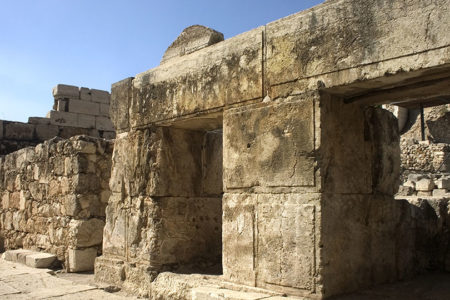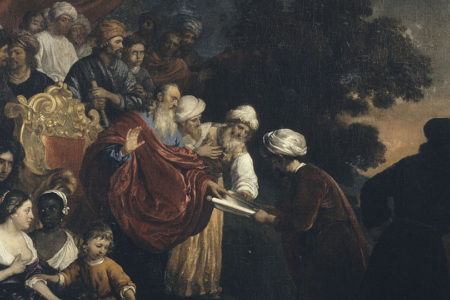The Love of God Part Two
The previous article began to focus on God’s love in the Old Testament. God’s love involves a confirmed, inner, favorable disposition toward the objects of His love and a high, passionate degree of action on behalf of them.
Abraham, Isaac, and Jacob—the fathers of the nation of Israel—were special objects of God’s love. In fact, the Old Testament reveals that Israel was a primary object of God’s love and that God intended His primary love for Israel to be permanent, guaranteeing the nation’s unique relationship with Him forever.
Expressions of God’s Love for Israel
God’s love for Israel is expressed in a number of places and in various ways in the Old Testament.
Moses’ statements to Israel.
The Lᴏʀᴅ did not set His love on you nor choose you because you were more in number than any other people, for you were the least of all peoples; but because the Lᴏʀᴅ loves you, and because He would keep the oath which He swore to your fathers, the Lᴏʀᴅ has brought you out with a mighty hand, and redeemed you from the house of bondage, from the hand of Pharaoh king of Egypt (Dt. 7:7–8).
Balak, the king of Moab, hired Balaam to curse the Israelites when they pitched tents on the plains of Moab on their journey from Egypt to the Promised Land (Num. 22). Later Moses reminded the people how God helped them: “Nevertheless the LORD your God would not listen to Balaam, but the LORD your God turned the curse into a blessing for you, because the LORD your God loves you” (Dt. 23:5).
Shortly before Moses died he told the Israelites, “The LORD came from Sinai, and dawned on them from Seir; He shone forth from Mount Paran, and He came with ten thousands of saints; from His right hand came a fiery law for them. Yes, He loves the people” (33:2–3).
Queen of Sheba’s statement to Solomon. “Blessed be the Lᴏʀᴅ your God, who delighted in you, setting you on the throne of Israel! Because the LORD has loved Israel forever, therefore He made you king, to do justice and righteousness” (1 Ki. 10:9).
Hiram king of Tyre’s statement to Solomon. “Because the Lᴏʀᴅ loves His people, He has made you king over them” (2 Chr. 2:11).
God’s statements. “I am the Lᴏʀᴅ your God, the Holy One of Israel, your Savior; I gave Egypt for your ransom, Ethiopia and Seba in your place. Since you were precious in My sight, you have been honored, and I have loved you” (Isa. 43:3–4).
“When Israel was a child, I loved him” (Hos.11:1).
God said to Hosea, “Go again, love a woman who is loved by a lover and is committing adultery, just like the love of the LORD for the children of Israel, who look to other gods and love the raisin cakes of the pagans” (Hos. 3:1).
God stated the following concerning the people of Israel: “I drew them with gentle cords, with bands of love” (11:4).
Despite Israel’s unfaithfulness, God declared, “I will heal their backsliding, I will love them freely, for My anger has turned away from him” (14:4).
God said to Israel, “I have loved you” (Mal. 1:2).
Statement about God. “In His love and in His pity He redeemed them; and He bore them and carried them all the days of old” (Isa. 63:9).
The Permanency of God’s Primary Love for Israel
The Queen of Sheba said to Solomon, “Your God has loved Israel, to establish them forever” (2 Chr. 9:8).
God said to Israel, “Yes, I have loved you with an everlasting love” (Jer. 31:3).
Other Objects of God’s Love in the Old Testament
God’s love of individuals. When Bathsheba bore David a son, David named the son Solomon, which means “peace.”1 God loved Solomon and sent word through Nathan the prophet, “so he [Nathan] called his name Jedidiah, because of the Lᴏʀᴅ” (2 Sam. 12:25). The name Jedidiah means “loved by the LORD.”2
When God spared King Hezekiah’s life from premature physical death, the king acknowledged that it was because God loved him (Isa. 38:17).
God declared His love for Cyrus, the Medo-Persian king who would be His instrument to crush Babylon, end Israel’s Babylonian Captivity, and command and assist the Jews to return home to rebuild Jerusalem and the Temple (Isa. 48:14–15.) (Also see Isaiah 44:28; 45:1; and Ezra 1:1–11.)
God’s love of impersonal things. Psalm 78:68 indicates that, when God chose the place where He would dwell in a unique sense on Earth, He chose “Mount Zion which He loved,” within Israel’s tribe of Judah. Originally Zion was a hill on which a Jebusite fortress stood. David and his men conquered it. Then David dwelt in the fortress and called the location “the City of David” (2 Sam. 5:6–9).
Later David brought the Ark of the Covenant, God’s unique dwelling place, to Zion (6:1–17). After Solomon had the Ark moved to the Temple at nearby Mount Moriah, the name Zion was also applied to that holy mount where God dwelt (Joel 3:17; Mic. 4:7). Eventually it was applied to the city of Jerusalem (Ps. 48:1–2; Isa. 1:8).3 Scripture says, “The Lᴏʀᴅ loves the gates of Zion more than all the dwellings of Jacob” (Ps. 87:2).
God also loves justice: “For I, the Lᴏʀᴅ, love justice” (Isa. 61:8). The word translated “justice” has many different meanings. It can mean “decision,” “legal case,” “verdict,” “punishment and deliverance,” “right,” “righteousness,” “law,” “custom,” or “justice.”4 So which meaning is intended in Isaiah 61:8?
Since context determines the meaning of a word in its passage, two items related to the context of God’s statement must be noted. First, immediately after the statement, God declared, “I hate robbery for burnt offering.” The Hebrew word translated “robbery” refers to “a powerful, unlawful snatching away or stealing” of people, animals, and things.5
The Hebrew word translated “burnt offering” means “iniquity” or “injustice.”6 In conjunction with the meanings of this word, Old Testament language scholar J. Schreiner wrote, “Yahweh has nothing to do with injustice or wrong; he is completely free of it….He makes things right, acts rightly, punishes his adversaries, the wicked, and the evildoers, and makes the righteous prosper.”7
Second, the context of Isaiah 61:8 describes Israel’s situation when the Messiah will establish the future Millennial Kingdom. During most of Israel’s history, other nations have abused it and subjected it to many injustices. Because God loves justice and hates powerful, unlawful robbery and injustice, He will reverse Israel’s abusive and unjust treatment. When the Messiah establishes the future Millennial Kingdom, Israel will get spiritually right with God and finally fulfill its God-ordained purpose to be the spiritual leader of the world.
The Gentiles will recognize the Jews as God’s appointed spiritual servants and the people whom God has uniquely blessed. To enable the Jewish people to devote themselves to God’s service, the Gentiles will care for their livestock and fields. Ruined areas of the nation will be rebuilt or repaired. Double honor will replace Israel’s past shame, and Israel’s land inheritance will double. The people of Israel will have everlasting joy and an everlasting covenant with God (vv. 4–9).
Related to this promise are statements that God loves righteousness and judgment (Ps. 11:7; 33:5; 37:28) and those who follow after righteousness (146:8; Prov. 15:9).
He also loves the holy institution of Israel. Malachi 2:11 states, “Judah has profaned the Lᴏʀᴅ’s holy institution which He loves.” The Hebrew word translated “holy” refers to something that is set apart or consecrated exclusively to the Lord and, therefore, is loved by Him. In this context, the holy institution God loves is the nation of Israel.8 God intended Israel to be a holy nation—the holy seed—different, distinct, unique in contrast with the Gentile nations that worshiped false gods (Ex. 19:6; Dt. 7:1–9; Ezra 9:2). “Israel was holiness to the Lᴏʀᴅ” (Jer. 2:3).
To guarantee that Israel would remain “holy,” God forbade marriage with pagan Gentiles (Ex. 34:14–16; Dt. 7:3–4). He knew such marriages would influence the Israelites to worship false gods. The men of Judah, who had returned from the Babylonian Captivity to Israel’s homeland, had compromised the holy nature intended by God for the nation. They had divorced their Israelite wives and married pagan Gentiles (Ezra 9:1–2; 10:1–4; Neh. 13:25–27; Mal. 2:11–16).
ENDNOTES
- Eugene H. Merrill, “2 Samuel,” The Bible Knowledge Commentary, ed. John F. Walvoord and Roy B. Zuck (Wheaton, IL: Victor Books, 1985), 1:468.
- Ibid.
- Steven Barabas , “Zion,” The New International Dictionary of the Bible, pictorial ed. (Grand Rapids, MI: Zondervan, 1987), 1,089.
- B. Johnson, “mispat,” Theological Dictionary of the Old Testament (hereafter cited as TDOT), ed. G. Johannes Botterweck, Helmer Ringgren, and Heinz-Josef Fabry, trans. David E. Green, translated from Theologisches Worterbuch zum Alten Testament (Grand Rapids, MI: Eerdmans, 1998 ), 9:88–96.
- J. Schupphaus, “gazal,” TDOT, ed. G. Johannes Botterweck and Helmer Ringgren, trans. John T. Willis (Grand Rapids, MI: Eerdmans,1975), 2:457.
- J. Schreiner, “awel,” TDOT, ed. G. Johannes Botterweck, Helmer Ringgren, and Heinz-Josef Fabry, trans. Douglas W. Stott (Grand Rapids, MI: Eerdmans,1999), 10:523–524.
- Ibid., 529.
- Charles Feinberg, The Minor Prophets (Chicago: Moody Press, 1990), 256–257.







